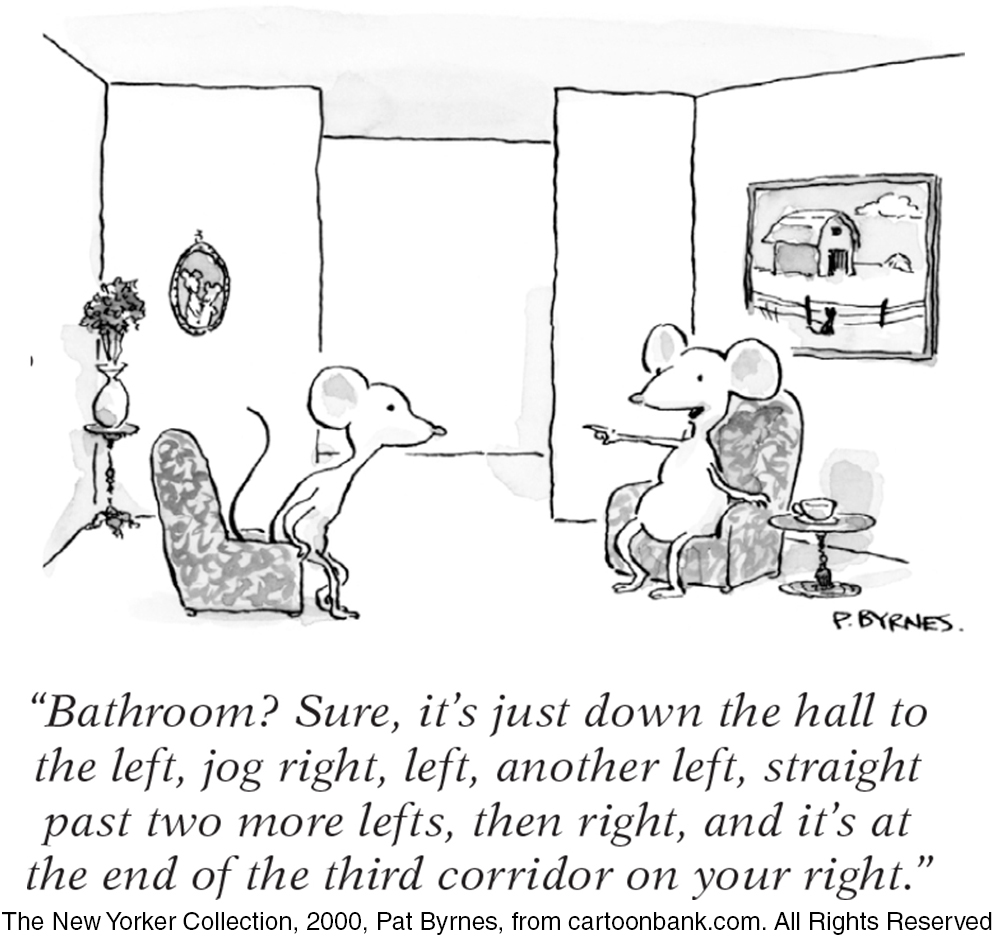21.2 Cognition’s Influence on Conditioning
21-
Cognition and Classical Conditioning
In their dismissal of “mentalistic” concepts such as consciousness, Pavlov and Watson underestimated the importance not only of biological constraints, but also the effects of cognitive processes (thoughts, perceptions, expectations). The early behaviorists believed that rats’ and dogs’ learned behaviors could be reduced to mindless mechanisms, so there was no need to consider cognition. But Robert Rescorla and Allan Wagner (1972) showed that an animal can learn the predictability of an event. If a shock always is preceded by a tone, and then may also be preceded by a light that accompanies the tone, a rat will react with fear to the tone but not to the light. Although the light is always followed by the shock, it adds no new information; the tone is a better predictor. The more predictable the association, the stronger the conditioned response. It’s as if the animal learns an expectancy, an awareness of how likely it is that the US will occur.
For more information on animal behavior, see books by (we are not making this up) Robin Fox and Lionel Tiger.
“All brains are, in essence, anticipation machines.”
Daniel C. Dennett, Consciousness Explained, 1991
Classical conditioning treatments that ignore cognition often have limited success. For example, people receiving therapy for alcohol use disorder may be given alcohol spiked with a nauseating drug. Will they then associate alcohol with sickness? If classical conditioning were merely a matter of “stamping in” stimulus associations, we might hope so, and to some extent this does occur. However, one’s awareness that the nausea is induced by the drug, not the alcohol, often weakens the association between drinking alcohol and feeling sick. So, even in classical conditioning, it is—
Cognition and Operant Conditioning
B. F. Skinner acknowledged the biological underpinnings of behavior and the existence of private thought processes. Nevertheless, many psychologists criticized him for discounting cognition’s importance.
A mere eight days before dying of leukemia in 1990, Skinner stood before the American Psychological Association convention. In this final address, he again resisted the growing belief that cognitive processes have a necessary place in the science of psychology and even in our understanding of conditioning. He viewed “cognitive science” as a throwback to early twentieth-
Nevertheless, the evidence of cognitive processes cannot be ignored. For example, animals on a fixed-

cognitive map a mental representation of the layout of one’s environment. For example, after exploring a maze, rats act as if they have learned a cognitive map of it.
latent learning learning that occurs but is not apparent until there is an incentive to demonstrate it.
Evidence of cognitive processes has also come from studying rats in mazes. Rats exploring a maze, given no obvious rewards, seem to develop a cognitive map, a mental representation of the maze. When an experimenter then places food in the maze’s goal box, these rats run the maze as quickly and efficiently as other rats that were previously reinforced with food for this result. Like people sightseeing in a new town, the exploring rats seemingly experienced latent learning during their earlier tours. That learning became apparent only when there was some incentive to demonstrate it. Children, too, may learn from watching a parent but demonstrate the learning only much later, as needed. The point to remember: There is more to learning than associating a response with a consequence; there is also cognition. In other modules, we will encounter more striking evidence of animals’ cognitive abilities in solving problems and in using aspects of language.

intrinsic motivation a desire to perform a behavior effectively for its own sake.
The cognitive perspective has also shown us the limits of rewards: Promising people a reward for a task they already enjoy can backfire. Excessive rewards can destroy intrinsic motivation—
extrinsic motivation a desire to perform a behavior to receive promised rewards or avoid threatened punishment.
To sense the difference between intrinsic motivation and extrinsic motivation (behaving in certain ways to gain external rewards or avoid threatened punishment), think about your experience in this course. Are you feeling pressured to finish this reading before a deadline? Worried about your grade? Eager for the credits that will count toward graduation? If Yes, then you are extrinsically motivated (as, to some extent, almost all students must be). Are you also finding the material interesting? Does learning it make you feel more competent? If there were no grade at stake, might you be curious enough to want to learn the material for its own sake? If Yes, intrinsic motivation also fuels your efforts.
Youth sports coaches who aim to promote enduring interest in an activity, not just to pressure players into winning, should focus on the intrinsic joy of playing and of reaching one’s potential (Deci & Ryan, 1985, 2009). Doing so may also ultimately lead to greater rewards. Students who focus on learning (intrinsic reward) often get good grades and graduate (extrinsic rewards). Doctors who focus on healing (intrinsic) may make a good living (extrinsic). Indeed, research suggests that people who focus on their work’s meaning and significance not only do better work but ultimately enjoy more extrinsic rewards (Wrzesniewski et al., 2014).
Nevertheless, extrinsic rewards used to signal a job well done (rather than to bribe or control someone) can be effective (Boggiano et al., 1985). “Most improved player” awards, for example, can boost feelings of competence and increase enjoyment of a sport. Rightly administered, rewards can improve performance and spark creativity (Eisenberger & Aselage, 2009; Henderlong & Lepper, 2002). And the rewards that often follow academic achievement, such as scholarships and jobs, are here to stay.
TABLE 21.1 compares the biological and cognitive influences on classical and operant conditioning.
Biological and Cognitive Influences on Conditioning
| Classical Conditioning | Operant Conditioning | |
|---|---|---|
| Biological predispositions | Natural predispositions constrain what stimuli and responses can easily be associated. | Organisms most easily learn behaviors similar to their natural behaviors; unnatural behaviors instinctively drift back toward natural ones. |
| Cognitive processes | Organisms develop expectation that CS signals the arrival of US. | Organisms develop expectation that a response will be reinforced or punished; they also exhibit latent learning, without reinforcement. |
RETRIEVE IT
Question
Instinctive drift and latent learning are examples of what important idea?